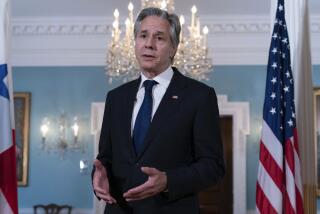Bush Tells Gorbachev He’s Not Trying to Make Trouble : Lithuania: A private message reiterates U.S. backing for a peaceful solution to the secession dilemma.
- Share via
WASHINGTON — With Soviet President Mikhail S. Gorbachev facing unrelenting pressure as a result of the Lithuanian independence movement, President Bush said Friday that he dispatched a confidential message to the Soviet leader to make sure the Soviets “understand our position and understand that we are not trying to make things difficult.”
The message, which was delivered Thursday evening to the Soviet Embassy in Washington, reflected the serious concern the Administration feels about the threat to Gorbachev and U.S.-Soviet relations posed by the secessionist movement.
In it, Bush was said by an Administration official to have reiterated U.S. support for a peaceful resolution of the dilemma the Baltic republic has created for Gorbachev in its three-week campaign to break away from the Soviet Union.
The President’s effort to reassure Gorbachev reflected a sharp shift in the Administration’s position in recent days as the Soviet leader has come under greater pressure at home to bring an end to the independence movement.
The message is similar in tone to statements made earlier in the week by White House and State Department officials as they sought to step back from previous, harsher warnings that had expressed concern that the confrontation in Lithuania would turn violent.
It follows a series of reports to the White House from visitors to Moscow, including the former chairman of the Joint Chiefs of Staff, retired Adm. William J. Crowe Jr., and Sen. Edward M. Kennedy (D-Mass.), that Gorbachev is “starting to feel the pinch” posed by Lithuania, the Administration official said.
“The Soviet leadership at the highest levels is of the opinion that they can’t let Lithuania go,” said the official, speaking on the condition of anonymity.
On March 11 the newly elected Lithuanian Parliament declared the independence of the republic, which has been a part of the Soviet Union for 50 years.
Bush, speaking briefly with reporters, said Friday that he sent the message because “I do not want to risk misunderstanding by failing to communicate.”
“I want to be sure that the Soviets understand our position and understand that we are not trying to make things difficult for Lithuania or for the Soviet Union or anybody else,” he said.
Secretary of State James A. Baker III had sent a similar message Sunday to Soviet Foreign Minister Eduard A. Shevardnadze. When no reply was received, it was decided that Bush should contact Gorbachev, Administration officials said.
In Dallas, Baker said in an appearance before the World Affairs Council that “a dangerous impasse . . . has developed in recent weeks.”
“It’s important that the United States continue to call for the resolution of this issue through dialogue, through negotiation, in a peaceful manner, so that ultimately the people of Lithuania can indeed enjoy genuine independence,” Baker said.
Even as the Administration has sought to lower the tenor of the debate over Lithuania, some of its allies in the Senate have taken an opposite course.
“All bets are off” if the Kremlin resorts to force to bring Lithuania back into the fold, Senate Minority Leader Bob Dole (R-Kan.) said.
“The Soviets will be in real trouble here--no trade agreements, no trade preferences and no more of the kind of relations the Kremlin is desperately seeking from Washington,” Dole said. “It would be a severe blow to U.S.-Soviet relations.”
Meanwhile, a Soviet deputy consul general was blocked by the State Department from making a speech at Sierra Nevada College in Incline Village, Nev., after a U.S. diplomat was barred from traveling to Lithuania, the Soviet Consulate in San Francisco reported, according to Reuters news agency.
Separately, the Pentagon said Friday that Army Chief of Staff Gen. Carl Vuono had postponed indefinitely a scheduled visit to the Soviet Union because of the situation in Lithuania.
More to Read
Sign up for Essential California
The most important California stories and recommendations in your inbox every morning.
You may occasionally receive promotional content from the Los Angeles Times.













